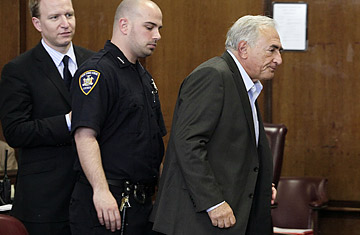
Former IMF chief Dominique Strauss-Kahn, right, leaves a New York City courthouse on May 19, 2011

This post is in partnership with Worldcrunch, a new global news site that translates stories of note in foreign languages into English. The article below was originally published in Le Monde.
There is no end to the wild talk unleashed by Dominique Strauss-Kahn's arrest by the New York City police on May 14 over charges of sexual assault, unlawful imprisonment and attempted rape. As if the extraordinary nature of this affair and the mind-blowing — and dramatic — situation in which the former head of the International Monetary Fund now finds himself could justify the most extravagant of explanations.
Ever since the news first broke on Sunday, May 15, the notion that it was all a setup meant to bring down Strauss-Kahn has spread like wildfire, especially on the Internet. The world of imagination being boundless, each theory brought forward seems more surprising than the other: they point to the CIA or rivals inside the IMF, to big American banks or financial interests threatened by Strauss-Kahn's push for more regulation, to murky schemes by some "black Cabinet" working for Nicolas Sarkozy at the Élysée Palace or even to Socialist Party rivals only too eager to get rid of a dangerous candidate ahead of the 2012 presidential elections.
Conspiracy theories have been fanned by the fact that certain political figures — supporters of Strauss-Kahn, among others — have seemed unwilling to exclude the possibility of a trap or manipulation. During an interview with the French newspaper Libération that took place on April 28, Strauss-Kahn himself had alluded to the possibility that such a setup could be organized by his enemies.
To crown it all, a poll conducted on Monday, May 16, by the CSA Institute found that 57% of the French public believes that the former head of the IMF "is the victim of a plot," with the number reaching 70% among left-leaning voters.
Regardless of whether the poll in question is legal or not — the Guigou law adopted in 2000 requires that no such polls be taken about someone protected by the presumption of innocence — the inquiry reveals significant details about the state of mind in the country of "I think, therefore I am" philosopher René Descartes and beyond.
It is only normal that most people find this matter utterly shocking — and captivating — given that the alleged sex scandal involves one of the world's most powerful men, a potential candidate for the presidency of the French Republic. But does this mean we should suddenly stop analyzing the facts with caution and common sense? Obviously not. Unless we are ready to admit that challenging all authority, and especially the authority of justice (be it American, in this case), has now reached a disturbing point of no return. Unless we are ready to say that the media's investigative efforts no longer carry any weight compared with the crazy elucidations the Internet instantaneously spreads around the entire globe.
We should not again find ourselves so ready to surrender to the kind of frenzy of conspiracy theories that has spawned since the 9/11 attacks. Let us not forget that this phenomenon is one of the very sources of totalitarianism, a sign of a democracy in regression.
Also from Worldcrunch:
In Turkey, the Double-Edged Sword of Domestic Violence
— Le Figaro
War in Libya: Why It's So Difficult to Take Stock
— Le Monde
Can Think Tanks Remake Switzerland's 'Neutral' Foreign Policy?
— Le Temps
